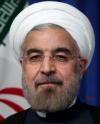On February 25, President Hassan Rouhani addressed crowds of people in Qom, a holy city whose clergy are influential in Iranian politics. Rouhani referred to Qom’s clergy as the “backbone” of Iran. His remarks focused on the issue of sanctions in the nuclear talks between Iran and the world’s six major powers – Britain, China, France, Germany, Russia, and the United States. Hardliners in Qom are critical of the negotiations and strongly oppose sanctions. Attempting to address these concerns, Rouhani said in his speech that "Iran will not accept any humiliation, obligation or continuation of sanctions in nuclear talks." The following are excerpts from Rouhani’s remarks.
“ The government motto was to save the economy, revive ethics and establish constructive interaction with the world. We will continue our way relying on the supports given to us by the Supreme Leader and people.”
The government motto was to save the economy, revive ethics and establish constructive interaction with the world. We will continue our way relying on the supports given to us by the Supreme Leader and people.”
 The government motto was to save the economy, revive ethics and establish constructive interaction with the world. We will continue our way relying on the supports given to us by the Supreme Leader and people.”
The government motto was to save the economy, revive ethics and establish constructive interaction with the world. We will continue our way relying on the supports given to us by the Supreme Leader and people.”“The talks should lead to lifting of all unfair and illegal sanctions against Iran.”
“Our motto is the economic revival and constructive interaction with the world.”
“We have participated in nuclear talks powerfully and we continue it based on logic away from all marginal issues.”
“Sanctions are unfair and development is absolute right of people. The other side in negotiation should know that Iran will never give up with its scientific development.”
“The final agreement must include removal of all unfair, illegal sanctions. Iran will not accept any humiliation, obligation or continuation of sanctions in nuclear talks.”
"We have taken important steps in area of foreign policy in relations with the regional states and other world countries, have continued the path of problem settlement, especially with regard to the nuclear case, mightily and without heeding the marginal moves and will continue this path to the end."
"We are not isolated in the world, rather these are the others who are isolated. We continue our path and in the negotiations we don’t accept to undergo the will of others, humiliation and continued sanctions."
"Like all of the days of the history of this revolution, the government desires the support of the people and especially the support of the people of Qom, the seminary and the senior clerics."
"We will always respect critics and we tell them, just like supporters, that they have received government protection and will continue to do so...But subversion has no place in this country."
"For the government and the people of Iran, Qom is not a city, but the symbol of religious life.”
"I want to make clear that the government needs Qom" with its clergy forming the "backbone" of Iran. The seminary's independence would "never be compromised under the banner of a policy, a party or faction."
